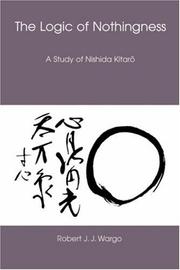| Listing 1 - 2 of 2 |
Sort by
|

ISBN: 0824829697 0824829301 9780824829698 9780824829308 0824873890 Year: 2005 Publisher: Honolulu: University of Hawai'i Press,
Abstract | Keywords | Export | Availability | Bookmark
 Loading...
Loading...Choose an application
- Reference Manager
- EndNote
- RefWorks (Direct export to RefWorks)
The writings of Nishida Kitarô, whose name has become almost synonymous with Japanese philosophy, continue to attract attention around the world. Yet studies of his thought in Western languages have tended to overlook two key areas: first, the influence of the generation of Japanese philosophers who preceded Nishida; and second, the logic of basho (place), the cornerstone of Nishida's mature philosophical system. The Logic of Nothingness addresses both of these topics. Robert Wargo argues that the overriding concern of Nishida's mature philosophy, the attempt to give a reasonable account of reality that includes the reasonableness of that account itself--or what Wargo calls the problem of completeness--has its origins in Inoue Enryo's (1858-1919) and Inoue Tetsujiro's (1855-1944) preoccupation with the problem of standpoints. A translation of one of Nishida's most demanding texts, included here as an appendix, demonstrates the value of Wargo's insightful analysis of the logic of basho as an aid to deciphering the philosopher's early work.
J1580 --- J1480 --- Japan: Philosophy -- individual philosophers -- Gendai (1926- ), Shōwa period, 20th century --- Japan: Philosophy -- modern philosophy --- Nothing (Philosophy) --- Nishida, Kitaro, --- Nothingness (Philosophy) --- Nihilism (Philosophy) --- Ontology --- Nishida, Kitarō, --- Kitaro, Nishida, --- 西田幾多郎, --- 西田几多郎, --- Nishida, Kitaro, - 1870-1945
Book
Year: 2005 Publisher: Cambridge National Bureau Of Economic Research. Working Paper Nr.11397. June 2005
Abstract | Keywords | Export | Availability | Bookmark
 Loading...
Loading...Choose an application
- Reference Manager
- EndNote
- RefWorks (Direct export to RefWorks)
| Listing 1 - 2 of 2 |
Sort by
|

 Search
Search Feedback
Feedback About UniCat
About UniCat  Help
Help News
News